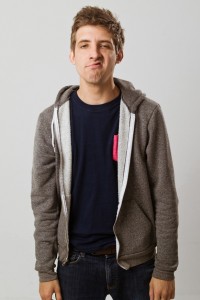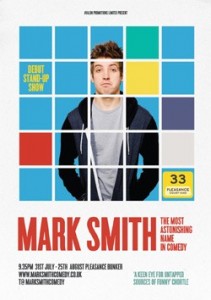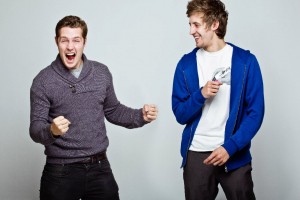
Have you ever felt “a bit short changed in terms of life” or that you’re one step away from getting “found out” as an imposter? Mark Smith understands. I knew there was a reason that I liked him. That and he’s also darn funny. Since starting in comedy a few years back while at University, Mark’s been living the life of a working comic gigging all over the U.K. Since 2010, he and pal Max Dickins have recorded their podcast, Dregs, a name coined by Mark’s father. The pair had been a part of sketch revue group, The Leeds Tealights, and dregs are, after all, the remnants of tealights. A few months back Mark debuted his solo Edinburgh Fringe show, The Most Astonishing Name in Comedy. Russell Howard introduced him as “One of the best new comics around”. I agree (as if Russell needs my approval).
In this chat, Mark tells me about all sorts of things: from comedy writing, gigging in intimate settings (not what you think) and the Edinburgh Fringe, to how he navigates expectations at parties and how he might like to while away some years.
Adam: When I was young, I wanted to be a doctor like the ones portrayed in the Australian TV serial A Country Practice. Then I realised I didn’t like the sight of blood (or stethoscopes for that matter) and so I thought maybe I could just star in A Country Practice. Those dreams of dramatic stardom didn’t pan out. What did you want to be and when did you decide that you wanted to get into comedy?
Mark: When I was little I very vividly remember that I wanted to be a doctor, but as I grew up I realised I wasn’t good enough with any of the scientific subjects at school. So that was that I guess. I didn’t ever really think about getting into comedy until I was about 21. I was always a huge fan of comedy but never saw it as a thing I was ‘allowed’ to do I suppose. Then my best friend started getting into it and I was like ‘hey, this is for us’.
Adam: Tell me about some of your first gigs.
Mark: My first gig was for the Chortle Student comedy competition. It was incredibly nerve wracking as you’d imagine. And I was rubbish, as you’d imagine. But there was something about it that I enjoyed and so I thought I’d give it another go. I’m still doing that really. Giving it one more go, every gig, until someone says that I mustn’t keep doing this.
Adam: After you’d started in comedy you didn’t pursue it intensely straight away?
Mark: I probably did about five gigs in the first six months. So no, not intensely at all. I was a student up in Leeds and there were a few really good comedy nights but nothing that was exclusively for the students. Bear in mind that this is a huge university with a massive student population, and there was no comedy for them whatsoever. So I decided to start a night at the [Leeds University] Union and MC that. It was ideal really, I got to get some stage time and the students got to see some excellent comedy for £4.
Adam: Comedians devise material in various ways and settings. In her book, Nat Luurtsema said that she dresses up to write even when she’s at home, and the choices may be a ball gown or silk and stilettos. She did acknowledge that some of her choices led her neighbour to suspect that she was a rather unsuccessful (given she was always home) sex worker. You’ve said before that you’re not the kind of comedian who begins with a blank page and starts writing. What is your process?
Mark: I basically write anything that I find funny in the notes in my phone. It could be anything, a turn of phrase, an idea or sometimes a fully formed joke. Then when my phone is filled up with those I’ll sit down and try and write about each of those ideas. Most of the time you look back on your phone notes and realise that what you’ve written is either impenetrable or just shit. Like I’ll often wake up in the middle of the night, write something down and think it’s brilliant. Then look at it in the morning and realise I’ve just written something like ‘dongboots’ in my phone. Nonsense. Other times though I find it’s a good jump off point. After that it’s a case of writing and testing it. And doing that until it works and is good enough for a paying audience to see.
Adam: Phyllis Diller invented her husband, “Fang”, for her routine. I think she said other comics used their real husband’s names, which was fine…until they died and they had to change the act. How do you decide how far to go with using real people or situations in your life?
Mark: Ha! I tend to use real names for real events because otherwise I’ll get all confused mid-routine. If ever I use a made-up event I go with the name Kelvin who is a friend of mine from back home and he doesn’t mind me doing that because he doesn’t exist.
Adam: Some of your standup deals with your dissatisfaction with a monosyllabic name. You have the opposite problem to say a Ben Kingsley (Krishna Pandit Bhanji), Alan Alda (Alphonso Joseph D’Abruzzo), Fred Astaire (Frederick Austerlitz), or even Benny Hill (whose original name, Alfred Hawthorne Hill, could have led to a life as a museum curator). You did go by the name Winston Smith for a while. How does having a simple name impact you (how do you ever know what you’re getting up to on Google?), and when changing it the first time why didn’t you experiment with the whole thing?
Mark: I think when I first started I worried about stupid shit like that. I thought Mark Smith was too boring a name and that people would forget it immediately but it turns out that no-one cares what your name is as long as you are good. If people want to Google me they can just bang the word comedy on the end of Mark Smith. EASY!
Adam: When I tell people at parties that my background is in psychology they usually ask, “Oh, are you going to analyse me?” Occasionally they’ll also want to know whether I can see their future. I have to then explain that, “No, I’m not a fucking fortune teller” (note: psychology, being the pseudoscience that it is, I do make use of crystal balls from time to time). Do people you meet expect you to always be ‘on’?
Mark: I think a lot of people do yeah. But generally it’s not too much of a problem. To be honest most of my friends now are in the same job or something similar and so it’s cool to not have that pressure. I never really liked it so when I first started I would tell people on a night out that I was an accountant or a delivery man or something else that never really needed any more explanation. Just a good, solid job that would cut any expectation. Now I’m fine with it.
Adam: You first performed at the Edinburgh Fringe in 2007 as part of an ensemble. You then went on to direct and write shows in subsequent years, appear with your Dregs podcast partner Max Dickins, and as part of The Comedy Zone showcase. Just a few months ago you debuted your solo show. How do you prepare for the Edinburgh Fringe and what’s it like for the performers once you’re there?
Mark: Edinburgh is an enormous, grizzly beast with huge blood-stained fangs and terrifying claws and a weird sort of grin on its face which has also got six eyes. Imagine that! I’m sorry what was the question? Yes Edinburgh, I have a love-hate relationship with it really. I love it when I’m not there but when I am, like most performers, it becomes all encompassing and engulfing. You start to think that the world revolves around this little bubble you create. I think it’s really unhealthy. Having said that, it is a wonderful place, the city is beautiful and it’s full of great comedy. I just wish it wasn’t seen as the biggest thing of the year. So many comics, including myself, see it as the focal point of the year whereas I think it should be seen as just a thing that happens. A really good, but horrendously gruelling thing that happens.

Adam: On one of your podcast episodes, you and Max were discussing playing to almost empty rooms.
Mark: Four’s quite good though, isn’t it?
Max: Well, it’s good in the context of having sold no tickets.
Mark: Yeah better than no. I can’t remember what I sold.
Max: What you sold.
Mark: I know sellout was used a lot. The word ‘sellout’, total sellout.
I’ve lectured to rooms with a capacity of 500 before that only had four students. How do you deal with that sort of thing?
Mark: It can be quite demoralising but that is the nature of Edinburgh, and gigs in general. As a new comic you learnt to play those tiny numbers so it’s not such a problem to be honest. Obviously it’s not ideal, but it’s fine. Sometimes it’s nice to have a small audience because you can literally get to know your entire audience. My favourite show of my last Edinburgh run was on the last night. I had seven people in and they were glorious. We had a proper laugh and everyone (I think) thoroughly enjoyed it. Obviously it’s a different sort of satisfaction to having a particularly good gig in a packed house but it’s still cool.
Adam: You’ve been recording Dregs since 2010. What do you enjoy most about the podcast?
Mark: I enjoy talking shit nonstop for a while and then letting our producer pick the bones out of it. We’ve been so lucky to always have a good producer. We had Joe Thomas for a couple of years and he is basically a genius. He’s now the youngest station controller in the entire country at a station in Oxford. Now we have Will who somehow manages to make even Max sound amusing at times. And that takes a lot. I like working with Max though, he’s a funny little shit.
Adam: I particularly like your ribbing of Max in his attempts to be a ‘Renaissance man’. And how almost in the same breath you guys can go from discussing ‘gravitas’ or ‘hyperbole’ to more “blue” humour.
Mark: Yeah, it’s pretty stupid most of the time. To be honest a lot of the time I feel like I black out and then only realise what’s been said when we hear the edit. I have a feeling that’s down to Max drugging me etc.

Adam: On Dregs you mention a lot of the travel you’ve done. Where is your favourite place so far and have you/will you gig overseas?
Mark: I love America. I go there as often as time permits and plan to drive all around someday. I love everything about it but particularly baseball. For some reason baseball has really got under my skin. It’s something I can absolutely get onboard with and given that that’s about the most American thing in the world it make sense to move there and watch it every day for the entirety of my life until I die of baseball.
In terms of gigging I haven’t done that much overseas. I went to do a couple of nights in the Middle East in Bahrain. That was cool. I’d like to a lot more though. Specifically Australia. I’d love to do Adelaide and Melbourne. I visited Oz when I was about 22 and did that whole student thing of going up the east coast. It was fucking amazing.
Adam: A lot of people would have become familiar with you through Russell Howard’s Good News. It’s quite popular here in Australia. How important is a show like that to building your profile? Do you like performing for TV?
Mark: I think it is very important, or at least it’s been very important for me. I don’t know if I like performing for TV because I’ve only really done it the once. Obviously it’s cool though and I’d like to do loads more of it.
Adam: What are your plans for 2014?
Mark: I’m currently co-writing a TV series with Nick Helm that is going to be filmed in June. On top of that I’m writing my new stand up show and trying to develop a couple of other TV things, so I guess we’ll just see what happens.
Adam: Anything else that you’d like to mention?
Mark: Yeah, get me on Twitter. Ha! What a shallow thing to say. But seriously, do. Like one in twenty of my tweets are reasonably funny.
Mark’s Twitter home he speaks of is found here. He also has a website (I knew I should have gotten something besides dot com. The .co.uk looks so pretty on his…). The Dregs podcast can be listened to here (via SoundCloud) or downloaded through iTunes.